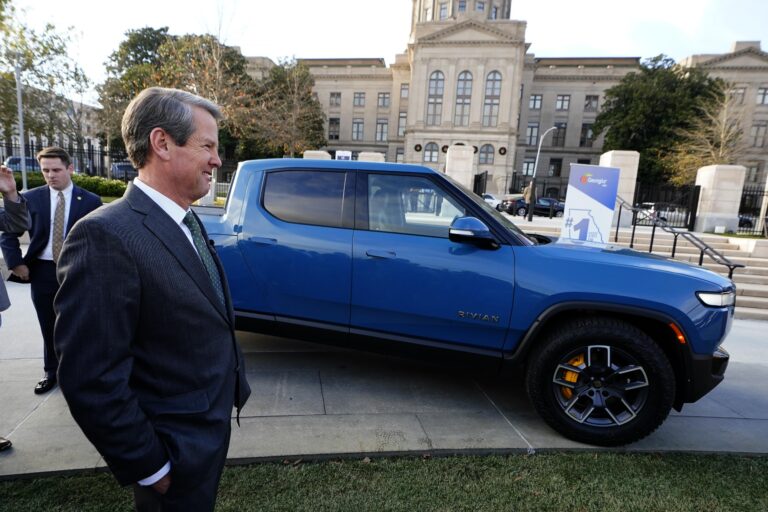Rivian Secures $6.6 Billion Federal Loan to Accelerate EV Manufacturing Expansion
Electric vehicle innovator Rivian has achieved a crucial breakthrough by obtaining a conditional federal loan valued at $6.6 billion. This substantial capital injection is designated to expand its manufacturing infrastructure and fuel the creation of next-generation electric trucks and SUVs. The funding reflects a broader governmental push to enhance domestic clean energy industries and fortify the U.S. electric vehicle sector amid intensifying global competition.
Rivian intends to allocate these funds toward scaling production capabilities, optimizing supply chain operations, and integrating advanced manufacturing technologies. The loan agreement highlights several core objectives:
- Facility Expansion: Building additional assembly lines and modernizing existing plants to increase output.
- New Model Progress: Designing and launching innovative electric pickups and SUVs to diversify Rivian’s portfolio.
- Workforce Growth: Creating thousands of new jobs and investing in employee training to support local economies.
- Lasting Manufacturing: Implementing eco-friendly production methods to minimize environmental impact.
| Aspect | Details |
|---|---|
| Loan Value | $6.6 billion (subject to conditions) |
| Primary Uses | Manufacturing expansion, new EV models, workforce enhancement |
| Expected Impact | Increased production capacity, job creation |
| Target Markets | U.S.and global electric vehicle consumers |
How the Federal Loan Will Propel Rivian’s Electric Vehicle Innovation
The conditional approval of this $6.6 billion loan represents a transformative opportunity for Rivian to fast-track the development and production of its upcoming electric vehicle lineup. This financial boost is expected to considerably enhance manufacturing throughput, enabling the company to introduce models that emphasize sustainability, cutting-edge technology, and superior performance.
Key anticipated outcomes include:
- Scaling Production: Expansion of existing plants and new production lines will alleviate current bottlenecks,accelerating delivery schedules.
- Accelerated R&D: Increased investment in research will drive advancements in battery efficiency, vehicle range, and autonomous driving capabilities.
- Broadened Market Reach: Development of diverse EV models, including electric pickups, SUVs, and potentially commercial vehicles, to capture varied consumer segments.
- Supply Chain Resilience: Strengthening supplier relationships and vertical integration to mitigate risks from global component shortages.
| Focus Area | Projected Result |
|---|---|
| Manufacturing Output | 30% increase within two years |
| New EV Models | Three new vehicles launched by 2025 |
| Employment Growth | Approximately 2,000 additional jobs |
| Emission Reduction | 20% decrease in carbon emissions per vehicle |
Navigating Production Expansion Challenges in a Competitive EV Landscape
Rivian’s plans to scale manufacturing come with a complex set of challenges and opportunities amid a rapidly evolving electric vehicle market. Increasing production capacity requires not only physical plant upgrades but also securing a reliable supply of essential components such as lithium-ion batteries and semiconductor chips. These efforts are complicated by ongoing global supply chain disruptions and rising raw material prices,which could delay production timelines and inflate costs.
Moreover, Rivian faces stiff competition from both established automakers like Ford and Tesla, and also emerging startups targeting the electric truck and SUV segments. However, the $6.6 billion federal loan provides a critical advantage, enabling Rivian to invest strategically in infrastructure and innovation to stay ahead.
- Increased Manufacturing Capacity: Meeting growing consumer demand with higher volume production.
- Enhanced R&D: Developing advanced EV technologies to differentiate products.
- Job Creation: Supporting local economies through workforce expansion and training.
| Challenge | Rivian’s Strategic Approach |
|---|---|
| Component Shortages | Strengthening supplier partnerships and vertical integration |
| Rising Costs | Implementing lean manufacturing and operational efficiencies |
| Market Competition | Innovative product design and enhanced customer engagement |
Maximizing the Impact of Federal Funding: Strategic Guidance for Rivian
To fully leverage the $6.6 billion federal loan, Rivian should adopt a comprehensive strategy emphasizing innovation, sustainability, and community involvement. Prioritizing the rapid development and rollout of diverse electric vehicle models will help expand Rivian’s market presence both domestically and internationally. Investing in breakthrough battery technologies and eco-friendly manufacturing processes will not only improve efficiency but also align with stringent environmental regulations and federal expectations.
Furthermore, fostering strategic alliances and workforce development initiatives will be essential for sustainable growth. Recommended actions include:
- Forming partnerships with technology companies and renewable energy providers to enhance supply chain robustness.
- Launching training programs to upskill employees and cultivate a highly skilled labor force.
- Engaging local communities to ensure plant expansions contribute positively to regional economic development.
| Strategic Focus | Initiative | Anticipated Benefit |
|---|---|---|
| Product Innovation | Introduce a diversified EV lineup | Expanded market share and increased sales |
| Sustainability | Enhance battery technology and green manufacturing | Reduced emissions and operational cost savings |
| Workforce Development | Implement employee upskilling programs | Job growth and higher productivity |
| Partnerships | Collaborate with tech and clean energy firms | Improved supply chain stability and innovation |
Conclusion: Rivian’s Path Forward in the Electric Vehicle Industry
The conditional approval of a $6.6 billion federal loan represents a landmark achievement for Rivian, empowering the company to significantly expand its manufacturing footprint and accelerate the launch of new electric vehicle models. This investment not only highlights the U.S. government’s dedication to fostering clean energy transportation but also cements Rivian’s role as a key contender in the rapidly evolving automotive sector. As Rivian advances with these ambitious initiatives, industry watchers will keenly observe how this funding shapes the future landscape of electric mobility across the nation.




